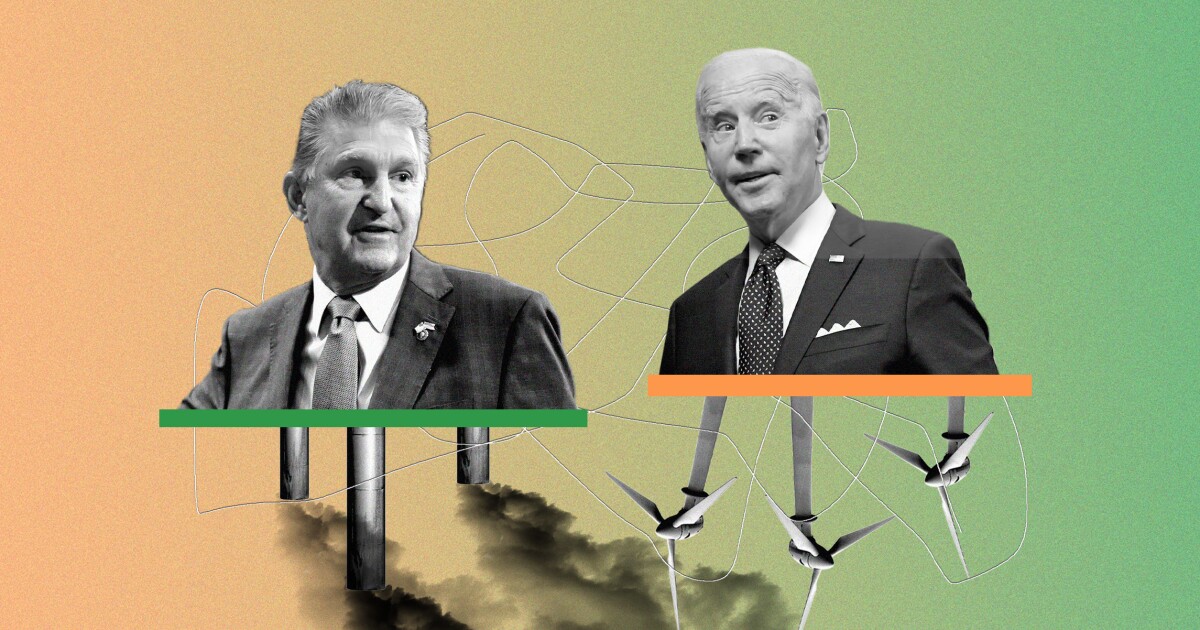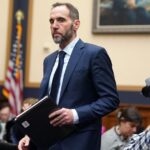

The most powerful man in Washington is named Joe, but which last name follows often depends on whom you ask, what’s up for discussion, and sometimes which day of the week it is.
Last Thursday, Sen. Joe Manchin (D-WV) once again frustrated fellow Democrats by declining to back new climate spending.
The move, which continues a pattern established when Manchin nixed the $3.5 trillion Build Back Better Act last December and refused to budge on the filibuster this spring, left progressives apoplectic at the centrist Democrat, who holds a controlling vote in the 50-50 Senate.
“It seems odd that Sen. Manchin would choose as his legacy to be the one man who single-handedly doomed humanity,” Center for American Progress board chairman John Podesta said in a statement. “But we can’t throw in the towel on the planet. Now, it’s more important than ever that President Joe Biden use all his authority to fiercely fight for the future.”
Other progressives, including Sen. Bernie Sanders (I-VT) and House “Squad” members Ilhan Omar (D-MN) and Alexandria Ocasio-Cortez (D-NY), expressed outrage at the move, with Sanders accusing Manchin of “intentionally sabotaging the president’s agenda.”
But on Friday, the other Joe — Biden — tried reasserting his dominance with the promise to take climate action on his own even if 51 senators disagree.
“Let me be clear,” the president said. “If the Senate will not move to tackle the climate crisis and strengthen our domestic clean energy industry, I will take strong executive action to meet this moment. I will not back down: The opportunity to create jobs and build a clean energy future is too important to relent.”
The same day, Manchin appeared to be open to the idea of coming on board for the climate proposals after all, saying he wanted to see July’s inflation numbers before moving forward: He didn’t want to do anything that would add to the 9.1% national inflation rate.
One key question in Joe vs. Joe is just how much Biden can legally do on his own, especially since the Supreme Court curtailed the Environmental Protection Agency’s ability to regulate without explicit congressional authority less than one month ago.
News emerged the following Tuesday of a potential presidential workaround. Anonymously sourced reports held that Biden may declare a climate emergency, which would unleash a new set of powers and funding under the National Emergencies Act of 1976. Biden’s predecessor, Donald Trump, used the act in 2019 to divert funding toward constructing a wall between the United States and Mexico by declaring an emergency at the southern border.
Democratic leaders, such as party strategist Brad Bannon, feel that the emergency route is the way to go because Manchin can’t be relied on.
“Congress churns as the world burns, and somebody has to take action,” Bannon said, citing record heat, droughts, and forest fires as the latest examples of the worsening climate. “I don’t think Manchin is ever going to come around.”
The senator himself insists his hesitancy is really about inflation and the potential for any new government spending to fuel it, even though the proposal also included new taxes on corporations and wealthy people designed to offset the impact.
To the extent that Manchin is driven by concerns about inflation, he is aligned with Biden, who now says combating it is his top priority as the issue drags down his approval ratings. But some claim other motivations drive the West Virginian, such as Manchin’s close ties to the oil and gas industry.
White House press secretary Karine Jean-Pierre said the climate emergency declaration would not happen by the end of the week, prompting questions about why and whether Manchin had anything to do with it.
“Is the climate emergency off the table because you’re worried it will upend the apple cart in the Senate with Sen. Manchin or others by going sort of too big, too fast?” one reporter asked.
Jean-Pierre demurred, using an oft-repeated phrase that she would “not negotiate in public” and adding that “our teams are in regular contact with Sen. Manchin and other members in the Senate and in Congress.”
The next day, Biden traveled to Somerset, Massachusetts, where he again indicated he may declare a climate emergency.
As the back-and-forth continued into a third week, Democrats like Bannon are increasingly calling for one Joe, the one in the White House, to assert his dominance over the other once and for all.
“Manchin said ‘no’ to the latest climate deal but said, ‘Well, give me a month or so, give me time to think about it,'” Bannon said. “In a month or so, he’s going to say he’s still not ready. The bottom line is, I don’t think the president can wait anymore.”






